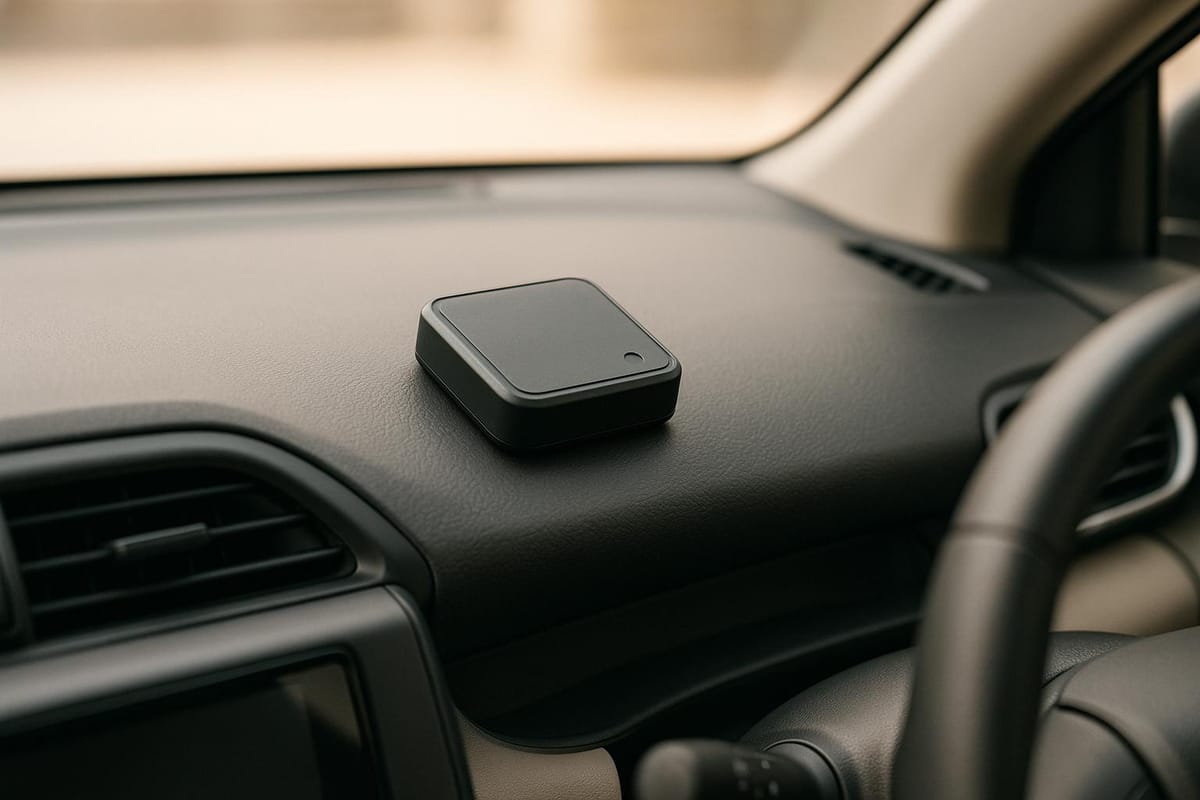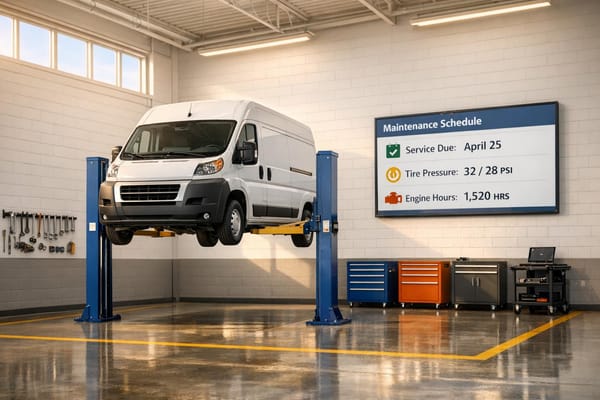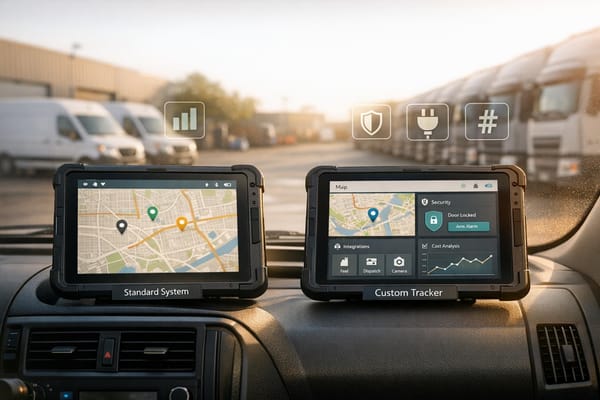How to Choose a Low-Cost GPS Tracker for Cars
Learn how to select an affordable and reliable GPS tracker for your car, balancing features, costs, and security for optimal protection.

If you're looking for a GPS tracker for your car, the key is finding one that balances affordability with reliability. Whether you're protecting against theft, monitoring driving habits, or managing a fleet, understanding the different types and features of trackers is crucial. Here's a quick breakdown:
- Hardwired Trackers: Installed into the car's electrical system, offering constant power and advanced features like engine immobilisation. Best for long-term use but requires professional installation.
- OBD Trackers: Plug-and-play devices connected to the OBD-II port. Easy to set up and portable, but more visible and potentially easier to remove.
- Portable Trackers: Battery-powered and flexible, ideal for temporary or multi-vehicle use. Requires regular charging.
Key Features to Look For:
- Real-time tracking and alerts for movement or emergencies.
- Geo-fencing to set boundaries and receive alerts if crossed.
- Mobile app compatibility for easy access to location and reports.
Costs:
- Prices start at around £30, but many devices require subscriptions (£7.99–£15/month) for data and app access. Consider both the upfront cost and ongoing fees to calculate the total cost of ownership.
For theft protection, advanced features like dual tracking (GPS + radio frequency) and 24/7 support can improve recovery rates. Providers like GRS Fleet Telematics offer reliable options starting at £7.99 per month.
Choosing the right tracker depends on your priorities - whether it's theft prevention, diagnostics, or ease of use. Balancing features with your budget ensures you get the best value.
Top 4 BEST GPS Trackers (2025) | Features & Installation | SafeTag Trackers
Types of GPS Trackers for Cars
Choosing the right GPS tracker for your car depends on your specific needs and budget. Each type offers distinct advantages and limitations, so understanding their features can help you make an informed decision.
Hardwired GPS Trackers
Hardwired GPS trackers are directly connected to your car's electrical system and are typically installed by professionals. Since they draw power from the car battery, there’s no need to worry about recharging or replacing batteries. These devices are usually hidden in secure locations like behind the dashboard or in the engine bay, ensuring constant power and discreet operation.
The biggest strength of hardwired trackers is their reliability. They’re tamper-resistant, always active, and often come with advanced features like detailed vehicle diagnostics, engine immobilisation, and precise location tracking. However, professional installation adds to the upfront cost, usually ranging from £50 to £150. Additionally, their fixed nature makes them less practical if you frequently switch vehicles.
For those seeking a simpler setup, plug-and-play options may be worth considering.
Plug-and-Play OBD Trackers
Plug-and-play OBD trackers connect to your car’s OBD-II port, which is standard in all UK vehicles manufactured after 2001. Typically located under the dashboard near the driver’s seat, this port allows for quick and easy installation - just plug it in, and you’re ready to go.
These trackers are perfect for anyone looking for a hassle-free setup without the added expense of professional installation. They draw power directly from the OBD-II port, ensuring continuous operation. Besides tracking your car’s location, OBD trackers provide valuable vehicle diagnostics, such as engine performance, fuel consumption, and maintenance reminders. Their portability makes them ideal for households with multiple vehicles or for individuals who frequently change cars.
The downside? Their visibility can be a security risk. Since the OBD port is relatively accessible, thieves can easily spot and remove these trackers. Some even specifically check for OBD devices, which could compromise your car’s security.
Portable Battery-Powered Trackers
Portable trackers run on internal rechargeable batteries, making them completely independent of your car’s electrical system. These compact devices can be placed almost anywhere - under seats, in glove compartments, or even magnetically attached to the vehicle’s exterior.
The flexibility of portable trackers is unmatched. You can move them between vehicles, use them for temporary tracking, or position them for optimal signal reception. Many models come with magnetic mounts, allowing discreet placement on the car’s undercarriage. Depending on the settings, battery life can range from one week to several months, with options to adjust reporting intervals for either frequent updates or extended battery life.
However, regular charging is essential. Forgetting to recharge the device could leave your vehicle untracked. Additionally, while portable trackers are easy to hide, they may still be discovered during a thorough vehicle search, though careful placement can reduce this risk.
When choosing a GPS tracker, balance convenience, security, and cost to find the option that best fits your needs. Each type has its strengths, so the right choice depends on how you plan to use it.
Key Features to Look for in Low-Cost GPS Trackers
When choosing a GPS tracker, balancing affordability with functionality is key. A device that offers the right mix of features and dependable performance ensures you're getting real value for your money. Here are some essential features to consider.
Real-Time Tracking and Alerts
The ability to track locations in real time is a must-have for effective monitoring. Look for devices that allow you to adjust update intervals - options can range from as frequent as every 2 seconds for active tracking to longer intervals to save battery life. Alerts are just as crucial. A good tracker should notify you instantly about unauthorised movement, speeding, or emergencies (SOS). Low battery alerts are also vital, giving you a timely heads-up when the device needs charging.
Geo-Fencing and Theft Notifications
Geo-fencing is another powerful feature that lets you set up virtual boundaries for your vehicle. You'll get immediate alerts if your car crosses these predefined zones, helping you quickly identify unexpected activity. On top of that, theft notifications can alert you to any unauthorised use, adding an extra layer of security to your vehicle.
Mobile App Compatibility and Access
A well-designed mobile app can make all the difference in your tracking experience. Most GPS trackers are compatible with both iOS and Android devices, often with web interfaces as well. Look for apps that offer intuitive maps with clear location markers, detailed route history (with storage options ranging from a single day to several years), and the ability to generate reports. Customisable alerts and notifications make it even easier to stay on top of important updates, keeping you in control at all times.
Cost and Subscription Considerations
When picking a GPS tracker, it’s important to weigh the one-time purchase price against ongoing fees. Balancing these costs helps you find a tracker that’s both effective and budget-friendly.
Initial Purchase Price
In the UK, entry-level GPS trackers for cars can start at around £30. These basic models typically provide essential tracking features without breaking the bank. However, the exact price often depends on the device’s features and build quality. Keep in mind, though, that the upfront cost is only part of the equation - monthly data and service fees also play a role in the overall expense.
Subscription Plans and Data Costs
Many GPS trackers require a subscription to cover services like data transmission, server maintenance, and access to mobile apps. It’s essential to check what’s included in these subscriptions. For instance, providers like GRS Fleet Telematics are recognised for offering clear pricing plans and dependable tracking services.
Total Cost of Ownership
To get a full picture of the expenses, think about the total cost of ownership. This includes not just the initial purchase but also recurring fees over time. Adding up the device cost and subscription charges will give you a better sense of the tracker’s long-term value. Be sure to review the contract details to understand what features and services are included in the pricing.
Key points from the source material.
Security, Recovery Rates, and Support
When choosing a GPS tracker, it's essential to focus on robust security features and reliable recovery protocols. The best trackers combine advanced protection with dependable support services.
Advanced Security Features
Thatcham S5 systems offer features like remote immobilisation and driver identification to prevent unauthorised use and assist in vehicle recovery. If your car is stolen, remote immobilisation allows you to disable it, effectively stopping thieves from getting away.
Dual tracking technology uses both GPS and radio frequency to ensure accurate location tracking. This dual approach means that even if one method is disrupted, the other can still trace your vehicle. This added layer of security works hand-in-hand with responsive recovery support to maximise protection.
Tamper alerts are another vital feature. If someone tries to interfere with the tracker, the system sends push notifications, allowing you to act quickly in critical situations.
Recovery Rates and 24/7 Support
Even the most advanced security features need strong recovery systems and support to back them up. According to GRS Fleet Telematics, their dual-tracker technology boasts an impressive 91% recovery rate, showing how these features deliver tangible results.
Round-the-clock support is especially important during thefts, where every second matters. Professional monitoring centres can liaise with law enforcement, activate security features remotely, and guide you through the recovery process. GRS Fleet Telematics includes 24/7 support as part of their service, ensuring help is always available when you need it most.
Thatcham certification, combined with proven recovery rates, provides added reassurance. Many insurers acknowledge these benefits by offering lower premiums for vehicles equipped with Thatcham-approved trackers.
When assessing GPS trackers, opt for those with a solid reputation and comprehensive support services. Skimping on features for a cheaper option may save money upfront, but it could leave you vulnerable in an emergency. Investing in a tracker with these security measures ensures reliable protection for your vehicle without compromising affordability.
Conclusion: Making the Right Choice for Your Needs
Finding the right GPS tracker for your car is all about weighing your specific needs against your budget. There are three primary types - hardwired, OBD plug-and-play, and portable battery-powered - each catering to different requirements and price ranges. Think about how you’ll use the tracker: do you need a permanent installation, or are features like real-time alerts and geo-fencing more critical for your situation?
When budgeting, don’t stop at the purchase price. Monthly subscription fees, usually between £7.99 and £15, and any activation charges should also be considered. For example, a basic tracker priced at £35 paired with a £7.99 monthly subscription adds up to around £131 in the first year.
If theft protection is a top concern, dual-tracker technology and recovery rates like GRS Fleet Telematics’ impressive 91% success rate offer peace of mind and practical security.
To get the most out of your tracker, professional installation and round-the-clock customer support are essential. These not only ensure optimal performance but can also help you meet insurance requirements.
Before making your final decision, think about what matters most to you. Are you focused on theft protection, monitoring driving habits, or simply keeping track of your vehicle’s location? Match these priorities with the features that best meet your needs. Keep in mind that while a cheaper option might save you money initially, it could lack the security features or reliable support you’ll need down the line.
For a balance of affordability and proven effectiveness, consider providers like GRS Fleet Telematics, offering robust vehicle recovery and protection starting at just £7.99 per month. Their solutions combine cost-conscious pricing with reliable performance, giving you confidence in your choice.
FAQs
What are the pros and cons of hardwired GPS trackers versus portable ones?
Hardwired GPS trackers are installed directly into your vehicle, providing consistent tracking and added security over the long term. These devices are built for permanence, but they do require professional installation and can't be easily transferred to another vehicle.
Portable GPS trackers, by contrast, are simple to use and can be moved between vehicles effortlessly. This makes them a great choice for short-term needs or situations where flexibility is key. However, they come with trade-offs, such as limited battery life and occasional signal challenges in remote areas. Your decision should depend on your priorities - whether it's the ability to switch vehicles frequently or prioritising robust security.
How do subscription plans affect the total cost of owning a car GPS tracker?
Subscription plans are a key factor in the total cost of owning a car GPS tracker, as they come with recurring monthly fees on top of the initial purchase price. These fees usually fall between £4.50 and £23 per month, depending on the features offered. Options like real-time tracking, geofencing, and advanced security measures can influence the price.
When selecting a GPS tracker, think about how these ongoing charges align with your budget in the long run. While basic plans are easier on the wallet, premium subscriptions often unlock additional features that might be worthwhile, depending on what you're looking for.
What are the key features to look for in a GPS tracker to protect against vehicle theft?
To bolster your car's security against theft, look for GPS trackers equipped with real-time location tracking, geo-fencing, and instant theft alerts. These tools let you keep tabs on your vehicle's location, define safe zones, and get immediate alerts if your car is moved without permission.
For an extra layer of protection, opt for trackers with remote immobilisation. This feature allows you to remotely disable the engine if a theft occurs. Choosing a tracker with these advanced features not only enhances your vehicle's safety but also increases the likelihood of recovering it quickly should it ever be stolen.




